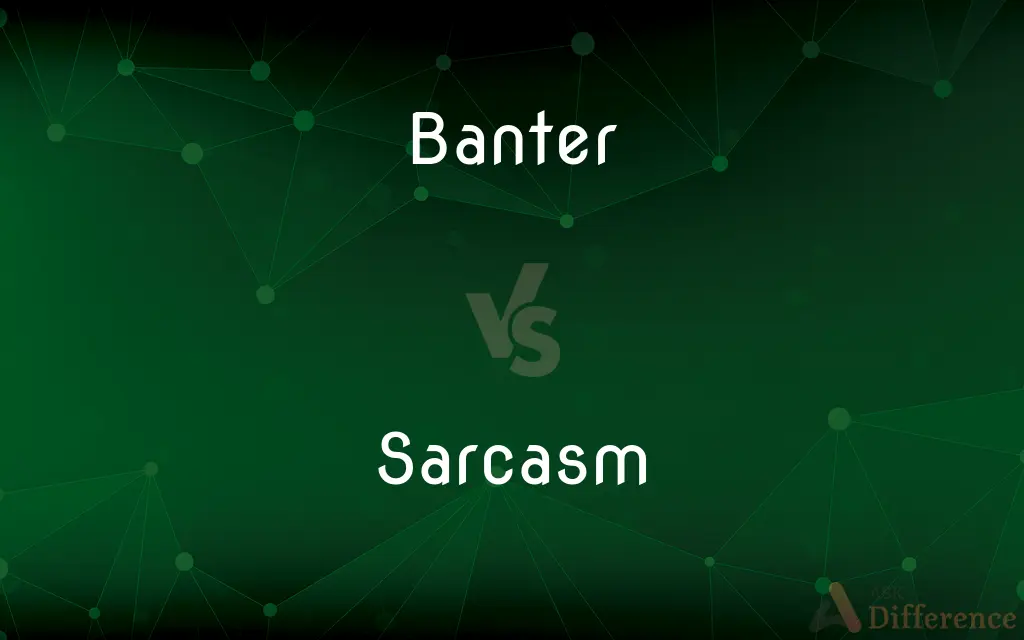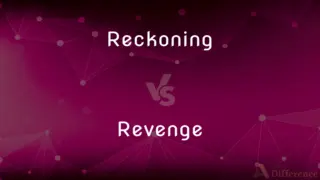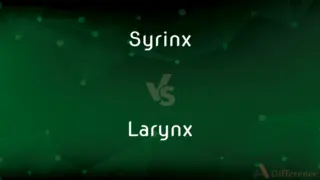Banter vs. Sarcasm — What's the Difference?
By Tayyaba Rehman & Urooj Arif — Updated on March 11, 2024
Banter involves playful and friendly exchange of teasing remarks, while sarcasm often employs irony or mock praise to convey contempt or ridicule.

Difference Between Banter and Sarcasm
Table of Contents
ADVERTISEMENT
Key Differences
Banter is characterized by light-hearted, teasing conversation among friends or colleagues, aimed at amusing all parties involved. It's generally seen as a sign of familiarity and comfort among individuals. On the other hand, sarcasm can be more cutting and is often used to express disdain or mock someone, sometimes under the guise of praise or innocent commentary.
While banter is inclusive and seeks to build relationships through humor and playful teasing, sarcasm, by its nature, might exclude or hurt the target, depending on the intent and context. Sarcasm requires a certain level of wit and understanding between the speaker and the listener to be taken as intended, whereas banter is more straightforward in its aim to entertain.
The context in which banter and sarcasm are used is crucial to understanding their impact. Banter is commonly found in situations where all participants are willing and eager to engage in this kind of exchange. Sarcasm, however, can emerge in both friendly and antagonistic contexts, with its reception heavily dependent on the relationship between the individuals and the tone used.
Banter fosters a sense of camaraderie and can strengthen bonds by showing that participants can tease and be teased without taking offense. Conversely, sarcasm, particularly when used sharply, can serve to establish a power dynamic, with the user asserting dominance or superiority over the recipient, which can potentially harm relationships if not carefully managed.
Despite their differences, both banter and sarcasm rely heavily on the cultural and contextual understanding of the participants to be effective and appreciated. What constitutes playful banter in one culture or group may be seen as disrespectful in another, just as sarcasm's subtlety and intent can be misinterpreted across different social contexts.
ADVERTISEMENT
Comparison Chart
Definition
Playful and friendly exchange of teasing remarks
Use of irony or mock praise to convey contempt or ridicule
Intent
To amuse and create a sense of camaraderie
To mock or convey disdain, though sometimes playfully
Tone
Light-hearted and inclusive
Can be cutting, derisive, or playful depending on context
Context
Among friends or colleagues, indicating comfort
Varies; can be friendly or antagonistic
Impact on Social Bonds
Strengthens bonds through mutual teasing
Can either challenge bonds or reinforce them, depending on reception
Compare with Definitions
Banter
Playful teasing and joking among friends.
The banter at the dinner table kept everyone laughing.
Sarcasm
Irony or mock praise used to convey ridicule.
His sarcasm was evident when he called the disastrous presentation stellar.
Banter
Builds and strengthens social bonds.
Their playful banter brought them closer as friends.
Sarcasm
Often to criticize or mock, though it can be playful.
She used sarcasm to subtly express her displeasure.
Banter
To amuse and engage in a light-hearted exchange.
Their banter during the game added to the fun atmosphere.
Sarcasm
Can be derisive or humorously critical.
His sarcasm about the policy didn't go unnoticed by the committee.
Banter
Generally positive and inclusive.
The team's banter was a sign of their close-knit relationship.
Sarcasm
Can be both friendly banter and antagonistic.
Their sarcasm masked the seriousness of their actual critique.
Banter
Friendly and familiar environments.
Office banter is a common way to break the ice among coworkers.
Sarcasm
Can challenge or reinforce social bonds, depending on how it's received.
Her constant sarcasm started to strain their relationship.
Banter
The playful and friendly exchange of teasing remarks
There was much good-natured banter
Sarcasm
Sarcasm is the use of words usually used to either mock or annoy someone, or for humorous purposes. Sarcasm may employ ambivalence, although it is not necessarily ironic.
Banter
Exchange remarks in a good-humoured teasing way
The men bantered with the waitresses
Sarcasm
A cutting, often ironic remark intended to express contempt or ridicule.
Banter
Good-humored, playful, or teasing conversation.
Sarcasm
A form of wit characterized by the use of such remarks
Detected a hint of sarcasm in his voice.
Banter
To engage in banter
Bantered with her colleagues during a coffee break.
Sarcasm
(uncountable) Use of acerbic language to mock or convey contempt, often using irony and (in speech) often marked by overemphasis and a sneering tone of voice.
Banter
To speak to in a playful or teasing way
"She laughed and bantered him a little, remembering too late that she should have been dignified and reserved" (Kate Chopin).
Sarcasm
(countable) An act of sarcasm.
Banter
Sharp, good-humoured, playful, typically spontaneous conversation.
Sarcasm
A keen, reproachful expression; a satirical remark uttered with some degree of scorn or contempt; a taunt; a gibe; a cutting jest.
The sarcasms of those critics who imagine our art to be a matter of inspiration.
Banter
(intransitive) To engage in banter or playful conversation.
Sarcasm
Witty language used to convey insults or scorn;
He used sarcasm to upset his opponent
Irony is wasted on the stupid
Satire is a sort of glass, wherein beholders do generally discover everybody's face but their own
Banter
(intransitive) To play or do something amusing.
Banter
(transitive) To tease (someone) mildly.
Banter
(transitive) To joke about; to ridicule (a trait, habit, etc.).
Banter
(transitive) To delude or trick; to play a prank upon.
Banter
To challenge to a match.
Banter
To haggle; cheapen the price.
Banter
To address playful good-natured ridicule to, - the person addressed, or something pertaining to him, being the subject of the jesting; to rally; as, he bantered me about my credulity.
Hag-ridden by my own fancy all night, and then bantered on my haggard looks the next day.
Banter
To jest about; to ridicule in speaking of, as some trait, habit, characteristic, and the like.
If they banter your regularity, order, and love of study, banter in return their neglect of them.
Banter
To delude or trick, - esp. by way of jest.
We diverted ourselves with bantering several poor scholars with hopes of being at least his lordship's chaplain.
Banter
To challenge or defy to a match.
Banter
The act of bantering; joking or jesting; humorous or good-humored raillery; pleasantry.
Part banter, part affection.
Banter
Light teasing repartee
Banter
Be silly or tease one another;
After we relaxed, we just kidded around
Common Curiosities
What is banter used for?
Banter is used for amusement and to foster a sense of camaraderie among friends or colleagues.
Is sarcasm always negative?
Not always; it can be used playfully among friends who understand each other well, but it often carries a negative or mocking tone.
Why do people use sarcasm?
People use sarcasm for various reasons, including humor, criticism, or to express disdain more subtly.
How can sarcasm be distinguished from banter?
Sarcasm often involves irony and is used to mock or convey disdain, which distinguishes it from the more inclusive and friendly nature of banter.
How should one respond if sarcasm is not well-received?
It's important to apologize and clarify the intent, emphasizing the playful or humorous nature of the remark if it was misunderstood.
Can banter ever be considered hurtful?
While intended to be light-hearted, banter can sometimes be perceived as hurtful if it touches on sensitive topics or if not all parties are willing participants.
Can sarcasm strengthen relationships?
Yes, when used among individuals who appreciate and understand each other's sense of humor, sarcasm can strengthen bonds.
Is it possible for sarcasm to be misunderstood as banter?
Yes, especially in multicultural or diverse settings where linguistic and cultural nuances might lead to misinterpretation.
Why is tone important in distinguishing between banter and sarcasm?
Tone helps convey the speaker's intent, distinguishing between playful teasing and potentially hurtful mocking.
Are there any benefits to using sarcasm?
When used wisely, sarcasm can be a form of witty communication that entertains and engages listeners who understand the context.
What makes banter effective?
Banter is effective when it is mutual, understood, and enjoyed by all parties involved, indicating familiarity and comfort.
How does one navigate the use of sarcasm in professional settings?
It's crucial to gauge the company culture and the individuals' openness to humor, using sarcasm cautiously to avoid misinterpretation.
How can one improve their use of banter in social interactions?
Being observant of others' reactions and preferences, and choosing topics that are universally light and relatable, can enhance the effectiveness of banter.
How does the context affect the reception of banter and sarcasm?
The context, including the relationship between participants and the cultural background, greatly affects how banter and sarcasm are received and understood.
Can the use of sarcasm lead to misunderstandings?
Yes, because sarcasm relies on tone and context for interpretation, it can easily lead to misunderstandings.
Share Your Discovery

Previous Comparison
Reckoning vs. Revenge
Next Comparison
Syrinx vs. LarynxAuthor Spotlight
Written by
Tayyaba RehmanTayyaba Rehman is a distinguished writer, currently serving as a primary contributor to askdifference.com. As a researcher in semantics and etymology, Tayyaba's passion for the complexity of languages and their distinctions has found a perfect home on the platform. Tayyaba delves into the intricacies of language, distinguishing between commonly confused words and phrases, thereby providing clarity for readers worldwide.
Co-written by
Urooj ArifUrooj is a skilled content writer at Ask Difference, known for her exceptional ability to simplify complex topics into engaging and informative content. With a passion for research and a flair for clear, concise writing, she consistently delivers articles that resonate with our diverse audience.
















































